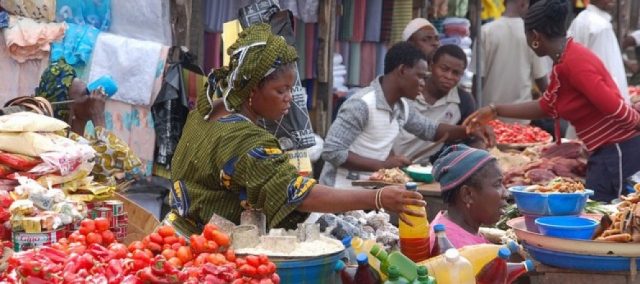
WED. 15 MARCH 2023-theGBJournal | Nigeria’s headline inflation rose by 10bps in February to 21.91% y/y (January: 21.82% y/y) in line with expectation and likely putting the Central Bank of Nigeria (CBN) Monetary Policy Committee on track for another interest rate hike Thursday after its meeting in Abuja.
The reading is 20bps lower than Cordros’ estimate (22.11% y/y), but 11bps higher than Bloomberg’s median consensus estimate (21.80% y/y).
However, on a month-on-month basis, headline inflation eased by 15bps to 1.71% (January: 1.87% m/m).
Food inflation increased marginally by 3bps to 24.35% y/y (January: 24.32% y/y). The slight increase in food prices was due to higher prices of Oil and Fat, Bread and Cereals, Potatoes, Yam and Other Tubers, Fish, Fruits, Meat, Vegetable, and Food Products.
Meanwhile, the inflation number published today by the National Bureau of Statistics (NBS) shows that on a month-on-month basis, food inflation increased by 1.90%, relative to the 2.08% m/m recorded in the previous month.
Elsewhere, the core inflation moderated by 31bps to 18.85% y/y (January: 19.16 y/y) – its first moderation since March 2022 (-10bps to 13.91% y/y).
Significant pressures were recorded in prices of Gas, Passenger Transport by Air, Liquid Fuel, Fuels, and Lubricants for Personal Transport Equipment, Vehicles Spare Parts, and Solid Fuel.
Compared to the previous month, the core index eased by 75bps to 1.07% m/m in February 2023.
At State level, All items inflation rate on a year-on-year basis was highest in Bauchi (24.59%), Rivers (24.40%), and Ondo (24.27%), while Sokoto (18.90%), Borno (18.94%) and Cross River (19.62%) recorded the slowest rise in headline year-on-year inflation.
On a month-on-month basis, however, February 2023 recorded the highest increases in Edo (2.76%), Ogun (2.64%), and Yobe (2.36%), while Bayelsa (0.74%), Borno (0.95%) and Taraba (1.03%) recorded the slowest rise on month-on-month inflation.
On the other hand, food inflation on a year-on-year basis was highest in Kwara (29.51%), Imo (27.47%), and Lagos (27.42%), while Sokoto (18.54%), Jigawa (19.67%) and Yobe (21.89%) recorded the slowest rise on year-on-year food inflation. On a month-on-month basis, however, February 2023 food inflation was highest in Yobe (3.15%), Edo (3.03%), and Ogun (2.90%), while Rivers (0.75%), Sokoto (0.89%) and Nassarawa (0.90%) recorded the slowest rise on month-on-month inflation.
Twitter-@theGBJournal|Facebook-the Government and Business Journal|email:gbj@govbusinessjournal.ng|govandbusinessj@gmail.com









